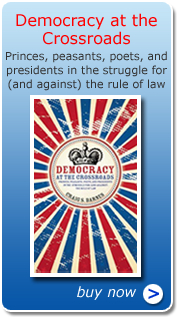The public has now learned that the super-secret National Security Agency has persuaded American telecommunications companies to allow whole trunk lines of electronic transmissions to be monitored. The Agency explains that they have not gone to court for individual warrants because they simply have been no individual suspects. This is, therefore, surveillance of the whole system of American communications. The president has approved blanket monitoring of the gateways to see what the Agency can come up with.
The NSA apparently has technological capacity to monitor millions of signals. If they see connections from some American location to Pakistan, or Kabul, or Iran, they say they want to look more closely and see if there is a pattern. To find such patterns, they have been trolling the whole telecommunications environment, searching the known universe.
The Foreign Intelligence Surveillance Act of 1978, however, requires a president to go to court to show probable cause—a specific criminal connection linked to a specific person—before he spies on American citizens. Mr. Bush has admittedly broken this law, asserting that he intends to continue to break it, and in addition, saying that he will strike back, launching an investigation to catch and punish whoever leaked his program. The leak was illegal, he says, and he will enforce the law against the leaker, though he takes a different view of the law applied to himself.
The Fourth Amendment to the US Constitution, by which the president is bound, prohibits unreasonable searches and seizures. The president says that his surveillance is not unreasonable. If, however, violating a congressional act written specifically to control the president is not unreasonable, what on earth is left? If it is not unreasonable to act illegally, what can unreasonable mean?
The enormity of the offense lies in the fact that the NSA is not just spying on a few individual suspects. They are spying on all of us, on whole trunk lines, to see who of us fits “a pattern.” When the initial surveillance identifies persons whose patterns suggest a connection to terrorism the NSA will then, presumably, seek court authority to listen to the details of those calls.
We have no guarantee, however, that the NSA will listen only to suspected terrorists or that they will refrain from listening to details of American business transactions, billings, tax reports, or even to personal matters, divorces, arguments and politics. There is no firewall to insulate Americans from this domestic spying other than the good faith assertions of a president who says he will not do that. His record does not breed confidence that he has the will or intention to be careful.
Every journalist covering foreign affairs has presumably been part of a “pattern” of calls to some region of the world. A journalist who is critical of the Bush administration, or hostile to the war in Iraq, or favors the social policies of Islam, cannot now be secure that his or her personal views will not be passed on from the NSA to some other executive branch and result in a tax audit, or secret complaints to his or her corporate boss.
I have been in communication with professional colleagues and associates in Moscow and the Caucuses for 20 years. I am quite clearly part of a “pattern” of people who are connected to the Former Soviet Union. There are, of course, terrorists in that part of the world and so perhaps the NSA has been collecting my emails. I have certainly not been supportive of the Bush invasion of Iraq. Has the NSA been listening, therefore, waiting to find out when emailed copies of my commentaries will cross some subjective line that they alone determine? Are there technicians in the basement of some giant monitoring complex, deciding whether any of these troublesome Iraq-war critics should be silenced? Will some operative consider presidential anger as if it were a command to put me, or any one of thousands like me, on some list, to be watched, to be taxed, or to be barred from the airlines?
The purpose of constitutional restraints was originally conceived to control a president who it was hoped would never become as arbitrary as George III of England. This president has turned the formula on its head and claimed that, to the contrary, the constitution sets him free. But if that is true, and if these extraordinary powers can last as long as wars last, that is, indefinitely, what is left of the difference between a president with unlimited powers, extending forever, and a king?
